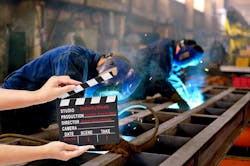IndustryWeek Presents the Feature Film ‘Factory, A Love Story’
Pop quiz: Outside of documentaries, have you ever seen a CNC machine in a TV show or a movie? How about a modern factory floor with IIoT sensors, digital signage and collaborative robots?
There was one tense scene in “Minority Report”—a completely autonomous, human-free factory cranking out futuristic Lexus vehicles. That movie is 20 years old. Rapper Eminem’s character worked at an automotive stamping plant in “8 Mile,” also from 2002.
When manufacturing leaders talk about recruitment problems, they often complain that young people see factory work as dark, dirty and dangerous. That’s certainly part of the problem, but a bigger issue is that people born in the past 30 years may have never seen any sort of manufacturing work in popular culture.
[Factory: A Love Story. No theory could constrain their passion.]
Want a movie that shows manufacturing as something that provides jobs and supports a community? You’d have to go back to 1986’s “Gung Ho,” a Michael Keaton film about how lazy and uncompetitive American manufacturers had gotten compared to Japanese companies.
Driving home this point was “Weird: The Al Yankovic Story.” In the heart-wrenching story of a young man who wanted to follow his dreams of playing the accordion and writing new lyrics to songs that already existed, Al’s stern father insisted that his son should instead join him at The Factory.
The Factory in the movie is the image that manufacturers worry about. Al’s father lost his hand there and blithely mentions fatalities in industrial equipment over dinner. Late in the film (spoiler alert), Al spends some time on the line where his job involves turning dials, waiting for lights to change colors and flipping levers.
What does The Factory make? That’s not important.
[Factory: A Love Story. There’s nothing dirty, dark or dangerous about this liaison.]
Pop culture can introduce people to new ideas. The CSI franchise convinced generations that forensic science was cool and that crime labs were staffed by beautiful people immediately solving crimes. It was a far sexier image than what Jack Klugman offered with 1976’s Quincy, M.E. and much more exciting than real lab work.
Anyone who’s worked at a factory knows that they’re filled with romance, comedy and drama. Would you watch a show set in an appliance plant where the night shift supervisor is falling in love with whoever’s leaving clever notes in production handover reports, not realizing that they’re from that annoying shift leader?
How about a workplace drama with an ambitious department manager who’s quietly flooding the MES with bad data to sabotage his peers in hopes of getting promoted?
We’re in a Golden Age of television and movies, and there’s an audience for everything. People watch shows about making cakes that look like things that aren’t cake. Why not a show about people making helicopters, cast-iron pans or semiconductors?
Years from now, when young people think about factory work, maybe they’ll remember that show where the production team programmed the cobots to dance whenever their boss said “actually” instead of Weird Al’s The Factory.
Send me your spec scripts. Have your people call my people. I smell an Oscar.
[Factory: A Love Story. Romance 4.0]
Main image: Photo Illustration by Robert Schoenberger using Photo 100090594 © Penchan Pumila | Dreamstime.com, Photo 116720592 © | Dreamstime.com.
About the Author
Robert Schoenberger
Editor-in-Chief
LinkedIn: linkedin.com/in/robert-schoenberger-4326b810
Bio: Robert Schoenberger has been writing about manufacturing technology in one form or another since the late 1990s. He began his career in newspapers in South Texas and has worked for The Clarion-Ledger in Jackson, Mississippi; The Courier-Journal in Louisville, Kentucky; and The Plain Dealer in Cleveland where he spent more than six years as the automotive reporter. In 2014, he launched Today's Motor Vehicles (now EV Manufacturing & Design), a magazine focusing on design and manufacturing topics within the automotive and commercial truck worlds. He joined IndustryWeek in late 2021.

